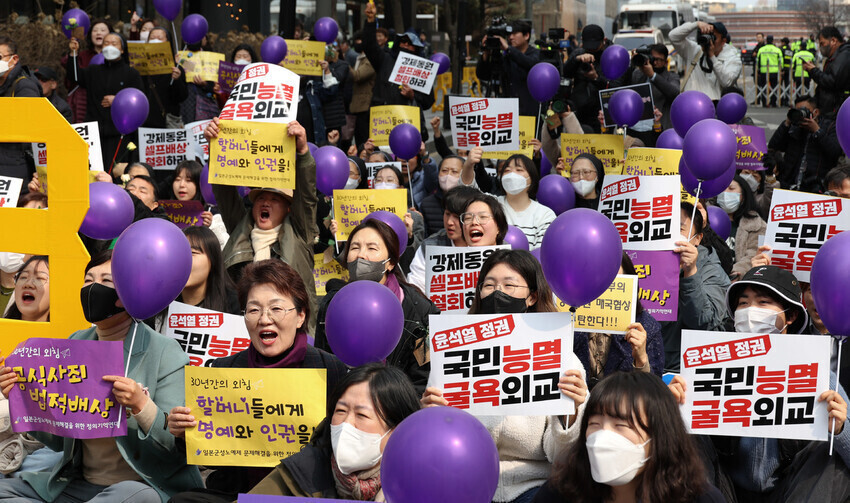hankyoreh
Links to other country sites 다른 나라 사이트 링크
[Editorial] Treating victims like obstacles is no way to achieve “world peace”

The 1,586th Wednesday Demonstration calling for a resolution to the Japanese military’s “comfort women” system of sexual slavery was held on Wednesday outside the former Japanese Embassy in Seoul’s Jongno District. This week, participants aimed their condemnations at the government’s compensation plan for victims of Japanese colonial era forced mobilization, which was announced by the Ministry of Foreign Affairs on Monday.
Unilaterally imposing a plan where compensation is provided by a third party without receiving the prior consent of the victims is clearly a form of secondary victimization. As such, it’s imperative that the Yoon Suk-yeol administration devise a plan to receive a true apology as well as compensation from Japan directly.
Those participating in the rally on Wednesday demanded the government “immediately withdraw the humiliating ‘solution’ to the forced labor problem, which ignores the human rights and the dignity of the victims.”
At the emergency declaration of the state of affairs held in front of the National Assembly’s main building on Tuesday, Yang Geum-deok and Kim Seong-ju, both survivors of forced mobilization, called on the government to withdraw the compensation plan.
“This is the first time I've felt so wronged. I will not accept such dirty money even if I have to starve to death,” said Yang. The cries of the two 94-year-olds, who have been in a legal battle over the forced mobilization issue for over 30 years, make it impossible to imagine the enormity of the affront inflicted on them by the Yoon government.
On the same day, however, Yoon lauded his government’s plan, calling it “the outcome of looking for ways to respect the victims’ positions while serving the common interests and future development of both Korea and Japan.”
Such remarks show how this current government truly views the victims of forced mobilization.
Claiming that compensation by a third party without any apology or compensation from the Japanese side is “respecting” the position of the victims means that they only viewed the victims’ fight as one aimed at obtaining money. In fact, it wouldn’t be much of a stretch to say that the South Korean president actually sees these victims as obstacles to his diplomatic strategy.
“It is clear that future-oriented cooperation between South Korea and Japan will help defend freedom, peace and prosperity not only in our two countries but also around the world,” Yoon said.
Even if we acknowledge this logic, how can we protect “freedom, peace and prosperity” if the human rights, dignity and even the very fact of the suffering of victims of colonial-era violence are ignored?
This is why the National Human Rights Commission of Korea issued a statement on Tuesday emphasizing that the Japanese companies implicated and the Japanese government admitting their illegal actions and apologizing to the victims and their families “is essential to establish a future-oriented and cooperative relationship between South Korea and Japan.”
Both the “solutions” to the military sexual slavery issue in 2015 and now to the forced mobilization problem in 2023 have the same roots in that they are not centered around the victims but instead poured salt in their wound.
How much more will it take to learn that we cannot move forward toward the future by trying to erase victims?
Please direct questions or comments to [english@hani.co.kr]

Editorial・opinion
![[Column] Season 2 of special prosecutor probe may be coming to Korea soon [Column] Season 2 of special prosecutor probe may be coming to Korea soon](https://flexible.img.hani.co.kr/flexible/normal/500/300/imgdb/original/2024/0426/3317141030699447.jpg) [Column] Season 2 of special prosecutor probe may be coming to Korea soon
[Column] Season 2 of special prosecutor probe may be coming to Korea soon![[Column] Park Geun-hye déjà vu in Yoon Suk-yeol [Column] Park Geun-hye déjà vu in Yoon Suk-yeol](https://flexible.img.hani.co.kr/flexible/normal/500/300/imgdb/original/2024/0424/651713945113788.jpg) [Column] Park Geun-hye déjà vu in Yoon Suk-yeol
[Column] Park Geun-hye déjà vu in Yoon Suk-yeol- [Editorial] New weight of N. Korea’s nuclear threats makes dialogue all the more urgent
- [Guest essay] The real reason Korea’s new right wants to dub Rhee a founding father
- [Column] ‘Choson’: Is it time we start referring to N. Korea in its own terms?
- [Editorial] Japan’s rewriting of history with Korea has gone too far
- [Column] The president’s questionable capacity for dialogue
- [Column] Are chaebol firms just pizza pies for families to divvy up as they please?
- [Column] Has Korea, too, crossed the Rubicon on China?
- [Correspondent’s column] In Japan’s alliance with US, echoes of its past alliances with UK
Most viewed articles
- 1After election rout, Yoon’s left with 3 choices for dealing with the opposition
- 2Why Kim Jong-un is scrapping the term ‘Day of the Sun’ and toning down fanfare for predecessors
- 3Two factors that’ll decide if Korea’s economy keeps on its upward trend
- 4Noting shared ‘values,’ Korea hints at passport-free travel with Japan
- 5AI is catching up with humans at a ‘shocking’ rate
- 6Why Korea shouldn’t welcome Japan’s newly beefed up defense cooperation with US
- 7‘We must say no’: Seoul defense chief on Korean, USFK involvement in hypothetical Taiwan crisis
- 8Exchange rate, oil prices, inflation: Can Korea overcome an economic triple whammy?
- 9Terry Anderson, AP reporter who informed world of massacre in Gwangju, dies at 76
- 10[Reportage] On US campuses, student risk arrest as they call for divestment from Israel